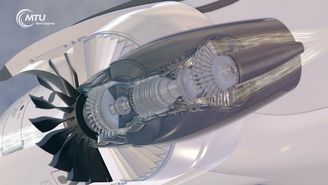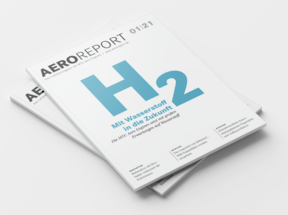
Press archive detail
MTU Aero Engines improves operating result and confirms 2011 year-end forecast
• EBIT rises by 8 % to € 244.3 million in the first nine months
• Net income up by 9 % to € 134.6 million
• Behle: “Continuing positive trend in the fourth quarter”
Munich, October 26, 2011 – MTU Aero Engines Holding AG increased its revenues in the first nine months of 2011 by 4 % to € 2,067.3 million (1-9/2010: € 1,992.3 million). The company's operating profit1 rose by 8 % to € 244.3 million (1-9/2010: € 226.1 million), while net income2 improved by 9 % to € 134.6 million (1-9/2010: € 124.0 million). The EBIT margin thus rose to 11.8 % compared with 11.3 % in 1-9/2010. “We are expecting a strong fourth quarter, both for series-production and spare-parts business, and also anticipate a positive trend in the commercial MRO business,” explained Egon Behle, CEO of MTU Aero Engines Holding AG. “These developments, along with the results of the first nine months, lead us to confirm our forecasts for the financial year. I am confident that we will achieve the targets we set ourselves for 2011.”
U.S. dollar exchange rate movements impacted MTU's revenues in both the commercial engine business and the MRO segment. Adjusted for the effect of this exchange rate, revenues rose by 10 %.
In the commercial engine business, including spare-parts sales, the company's revenues surged by
18 % to € 970.0 million (1-9/2010: € 821.6 million). The key revenue earners were the V2500 for the Airbus A320 family, the PW2000, which is deployed in the Boeing 757 and C-17, the CF6-80C, which powers the Boeing 747 and Airbus A310 and A330, and the GP7000 for the Airbus A380. The GEnx engine for the Boeing 787 Dreamliner and 747-8 is also gaining in importance.
In the period under review, the military engine business posted revenues of € 321.3 million compared with € 378.3 million in the first nine months of 2010, with the EJ200 engine for the Eurofighter making the biggest contribution. As expected, defense budget cuts are having a negative effect on military maintenance revenues.
Commercial MRO revenues weighed in at € 798.7 million (1-9/2010: € 814.4 million). Adjusted for the effect of the U.S. dollar exchange rate, MRO revenues rose by 5 %, with the biggest contributor being the V2500 engine for the Airbus A320.
At € 9,824.0 million, the total order volume — i.e. order backlog plus the value of commercial maintenance contracts — represents a workload of approximately three years’ production capacity (total order volume at Dec. 31, 2010: € 9,699.1 million). These figures do not yet include the orders for more than 1,000 geared turbofan engines for the A320neo.
MTU succeeded in improving its operating results in both the OEM and MRO segments.
The company posted an operating profit for the OEM business of € 181.1 million, which is a 9 % increase in EBIT (1-9/2010: € 165.9 million). The EBIT margin for this segment was 14.0 % (1-9/2010: 13.8 %).
EBIT for the commercial MRO business increased by 12 % to € 65.9 million (1-9/2010: € 58.8 million), while the corresponding EBIT margin rose by 1.1 percentage points to 8.3 %. “We thus succeeded in improving our EBIT margin for the MRO business for the third consecutive quarter. This success is attributable both to optimized operations management and an observable increase in repair depth per shop visit. We expect this trend to continue in the fourth quarter,” explained CFO Reiner Winkler.
MTU's R&D expenditure rose by 13 % to € 183.4 million (1-9/2010: € 162.0 million), with the company-funded share in R&D boosted by 12 % to € 116.0 million and customer-funded expenditure growing by 16 % to € 67.4 million. The main focus of R&D was on the engines of the PW1000G series, which propel the Airbus A320neo, the Mitsubishi Regional Jet, the Bombardier CSeries and the Irkut MS-21, as well as on the TP400-D6 engine for the A400M. “The geared turbofan programs are clearly the foundation for MTU's future success. In order to further safeguard the company's future, we have also recently increased our stake in the engine programs for the A320neo and the Bombardier CSeries,” said Behle.
Free cash flow reached € 109.9 million (1-9/2010: € 143.0 million).
Compared with the same period last year, MTU's capital expenditure on property, plant and equipment rose by 13 % to € 57.1 million (1-9/2010: € 50.7 million). The main areas of investment were the construction of a new blisk production hall in Munich, the purchase of leasing engines, and technical plant and machinery.
At the end of September 2011, MTU had 3.5 % more employees than at year-end 2010
(Dec. 31, 2010: 7,907 employees). Recruitment activities focused on the company's sites in
Hannover, Poland and Munich.
MTU confirms its forecast for the financial year 2011. Revenues are set to rise by 7–8 %. The company is expecting an EBIT adjusted of around € 325 million, with net income slightly higher than last year's € 182.3 million.
1 EBIT adjusted = Earnings before interest and tax, calculated on a comparable basis
2 Net income adjusted = earnings after tax, calculated on a comparable basis
MTU Aero Engines – key financial data for the first nine months of 2011
(Figures quoted in million €, calculated on a comparable basis. Statements prepared in accordance with IFRS. Figures calculated on a comparable basis apply adjustments to the IFRS consolidated results to exclude restructuring and transaction costs, capitalized development costs and the effects of IFRS purchase accounting).
| MTU Aero Engines | as at Sept. 2010 | as at Sept. 2011 | Change |
|---|---|---|---|
| Revenues | 1,992.3 | 2,067.3 | + 3.8 % |
| of which OEM business | 1,199.9 | 1,291.3 | + 7.6 % |
| of which commercial engine business | 821.6 | 970.0 | + 18.1 % |
| of which military engine business | 378.3 | 321.3 | - 15.1 % |
| of which commercial MRO business | 814.4 | 798.7 | - 1.9 % |
| EBIT (calculated on a comparable basis) | 226.1 | 244.3 | + 8.0 % |
| of which OEM business | 165.9 | 181.1 | + 9.2 % |
| of which commercial MRO business | 58.8 | 65.9 | + 12.1 % |
| EBIT margin (calculated on a comparable basis) | 11.3 % | 11.8 % | |
| for OEM business | 13.8 % | 14.0 % | |
| for commercial MRO business | 7.2 % | 8.3 % | |
| Net income (calculated on a comparable basis) | 124.0 | 134.6 | + 8.5 % |
| Earnings per share (undiluted), reported | € 2.04 | € 2.39 | + 17.2 % |
| Free cash flow | 143.0 | 109.9 | - 23.1 % |
| Research and development expenditure | 162.0 | 183.4 | + 13.2 % |
| of which company-funded R&D | 103.8 | 116.0 | + 11.8 % |
| of which outside-funded R&D | 58.2 | 67.4 | + 15.8 % |
| Capital expenditure on property, plant and equipment | 50.7 | 57.1 | + 12.6 % |
| Dec. 31, 2010 | Sept. 30, 2011 | Change | |
| Total order volume (order backlog + value of maintenance contracts) | 9,699.1 | 9,824.0 | + 1.3 % |
| of which OEM business | 4,331.5 | 4,166.1 | - 3.8 % |
| of which commercial MRO business | 5,367.6 | 5,657.9 | + 5.4 % |
| Employees | 7,907 | 8,182 | + 3.5 % |
About MTU Aero Engines
MTU Aero Engines is not only Germany's leading – and only independent – engine manufacturer, but a major player in the industry. Together with its affiliates, MTU maintains a presence in all key markets and regions. In the commercial engine sector, the company has close working ties with the world’s major aero engine manufacturers – General Electric, Pratt & Whitney and Rolls-Royce. In the military sector, MTU is the lead industrial partner for almost every type of engine operated by the German armed forces, and an important partner in all major military aero engine programs in Europe. MTU Maintenance is the world's biggest independent provider of maintenance services for commercial aircraft engines. The company is a technological leader in low-pressure turbines, high-pressure compressors, manufacturing processes, and repair techniques.
Press archive and photos: http://www.mtu.de
Cautionary note regarding forward-looking statements
Certain of the statements contained herein may be statements of future expectations and other forward-looking statements that are based on management’s current views and assumptions and involve known and unknown risks and uncertainties that could cause actual results, performance or events to differ materially from those expressed or implied in such statements. Actual results, performance or events may differ materially from those in such statements due to, without limitation, competition from other companies in MTU Aero Engines’ industry and MTU Aero Engines’ ability to retain or increase its market share, the cyclicality of the airline industry, risks related to MTU Aero Engines’ participation in consortia and risk and revenue sharing agreements for new aero engine programs, risks associated with the capital markets, currency exchange rate fluctuations, regulations affecting MTU Aero Engines’ business and MTU Aero Engines’ ability to respond to changes in the regulatory environment, and other factors. Many of these factors may be more likely to occur, or more pronounced, as a result of terrorist activities and their consequences. MTU Aero Engines assumes no obligation to update any forward-looking statement.



